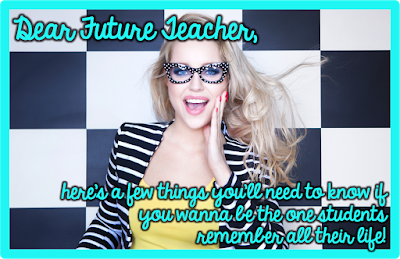I’m back
this week to talk a little bit about behavior management. I know that you will probably see a lot of
people talking about the color charts (and to be honest I used them for a LONG
time and LOVED them), but our school uses a different approach and we cannot use the color
charts. It has some pieces that are
GREAT and certainly some places to grow, but that’s what it’s all about right??
We use
Responsive Classroom, which could be implemented on a teacher by teacher basis,
but works best when the entire school has been trained. We are a Responsive School. We all went to a week long training over the
summer to get us ready – Some people have even be able to attend the second and
third trainings! I was a skeptic when we
started – how can a whole school response to behavior actually work? But for the VAST majority of kids it does and
a lot of the components are really FUN! Find out more at their site HERE!
There
are many components to a successful RC Classroom – more than you would want me
to go into today, but there are a few that without any RC training you could
implement in your classroom. Some you
are probably doing already.
1. The First Six Weeks of School
Routines, routines,
routines!! The RC program wants you to
spend 6 weeks working on routines, using guided discoveries to explore
classroom materials, and building a community.
I will be honest my school DOES NOT use all 6 weeks before teaching
content. However, we spend A LOT of time
teaching kids about the classroom. My
first week is filled with FUN, creative activities that also teach kids my
rules for using pencils, markers, crayons and glue sticks. This is time well spent at the beginning of the
year because it saves you time in the long run – They know what your
expectations are.
2. Rules In School
Some teachers use the
same rules year after year (I was one of them!!), but RC teaches that kids need
to be a part of the rule making process.
First we ask kids to share one thing they hope to learn this year (I
make this into an art project too). Then
once everyone has a hope/dream for the year, we make a list of some “rules” or
things we will need to do to make sure we reach those hopes and dreams. From that list kids can sort the rules and
whittle them down to 3 or 4 – NO MORE!
Usually they will all fall into 3 categories: respect to others, respect to materials,
respect to yourself.
3. Morning Meeting
Morning meeting is a
community building time at the beginning of the day that has some academic
components, but is more focused on the social needs of students. Students start in a circle on the carpet and
greet each other (not just with a Hello, but in MANY creative ways – we do a
new one each week!). Then, some students
have a chance to share (no toys!), but instead share something they did or
something going on in their lives and students can ask 3 questions or comments
about the share. Then students read a
message from me about the day. I often
sneak some learning in here, but leaving out letters or words for them to
spell. Finally, students have an
activity where they need to work together or just an activator, to get them
ready for the day.

There
are of course some kids who need MORE than what this structure can
provide. They need those sticker charts
that list their two rules (hands to yourself and quiet voice) and where they
can earn a break or trade in once they have earned all of those stickers. This is not a replacement for that at
all. Instead I find RC to be a way to
create a classroom community that believes in respect and caring.

There
are of course some pieces that I would like to work on RC talks about a Closing
Circle. This is a time to reflect on the
day, share things that went well or not so well, and to problem solve. It also could be a time to preview the next
day. I will be honest, some days we are
working until the last possible pack up minute and it’s hard to make time. I find it especially hard when we get
documents (like I did last week) that have specific number of minutes that need
to be spent teaching each subject and time for closing circle or even an end-of-day
book is not accounted for. I hope to
make it a goal for next year to spend some time working on my closing circles.
I can only imagine that my classroom community (and even my student’s discourse
skills) will benefit from that time.

Since we
use SO much of the RC programs, I haven’t made any behavior management products
up to this point. However, I DO use a
product from one of my favorite sellers, Cupcake for the Teacher. It’s not very RC, but can be a great
motivator for my students. Here is her
Star Jar in my room:
I LOVE
how as a teacher you can choose what they are earning stars for. For example, last year my class had a hard
time during specials, so they could earn a star for good listening and positive
behavior during a special. This year, I
had a group of chatterboxes. They earned
a star for making transitions without turning on their voices.
Find her
star jar HERE and read more about the Star Jar in my room HERE.
Thanks
for joining me on this reflection journey – Read more about what is working and
not working in some of my bloggy friends’ rooms! There is always more to learn!



























